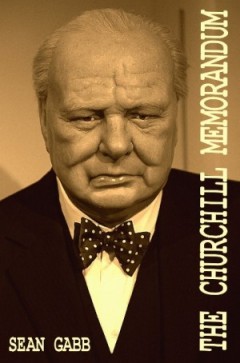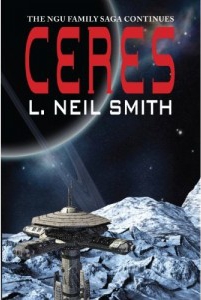
I recently read The Churchill Memorandum, by English libertarian Sean Gabb. I devoured most of it on a transatlantic flight, and finished the last bit on terra firma. I tend to like thrillers (some favorite authors include Nelson DeMille and, of late, Cherie Priest, author of Bloodshot); alternate history (e.g., Harry Turtledove, Brad Linaweaver’s Moon of Ice, L. Neil Smith’s The Probability Broach); and books with libertarian themes or influences (L. Neil Smith, Ayn Rand, Henry Hazlitt, Brad Linaweaver, Victor Koman, J. Neil Schulman). So it’s no surprise I enjoyed The Churchill Memorandum, which is very well written and which combines all three features (full disclosure: Gabb is a friend).
The novel is set in 1959, in an alternate history in which Hitler died in a car accident in 1939, thus averting WWII and changing the course of history. Gabb’s libertarian influences — he’s the head of the UK Libertarian Alliance — as well as his deep historical knowledge, are evident throughout the book. The novel depicts amazing technological progress — some of it rivaling or exceeding 2011 levels — in 1959, since WWII did not occur to sap away the economic strength and entrepreneurial innovations of tens of millions of individuals who would otherwise have been eviscerated in state war. So in 1959 there are magnetic bullet trains, home energy generators, and many other seemingly fantastic innovations.
The story follows the adventures of one Anthony Markham, a Churchill historian who, on a trip to the now-fascist police-state and isolationist America to research the Churchill archives at Harvard, stumbles across an explosive document that purports to document secret pacts that changed the course of American and world history. This leads to an intriguing geopolitical thriller informed by the author’s libertarian views. It is told in first person point of view (POV), my personal favorite for thrillers (and other novels) since it forces the narrator to show not tell, and not to omnisciently cheat and reveal details the protagonist would not know. Gabb’s ambivalent and somewhat bipolar English attitude towards America — at once a great power and friend of England, and a schizophrenic and dangerous destroyer of the ancient European order and institutions — is present throughout; and as a skeptic of the American mythos myself, I really enjoyed this foreign perspective. (Gabb recently presented a talk on “The Case Against the American War of Independence.”)
[continue reading…]
Help Promote Prometheus Unbound by Sharing this Post
Finalists for the 2011 Prometheus Award for best libertarian novel were announced just yesterday. One finalist, Ceres, by past award-winner L. Neil Smith, has already been reviewed on Prometheus Unbound. Also making the cut is Cory Doctorow’s For The Win. I have a copy of this novel and plan to review it soon, after I publish a few overdue reviews.
As a reminder to our readers, we are open to submissions of reviews (as well as news, articles, interviews). Even if you can’t contribute regularly, we’d like to have a number of part-timers on our staff who only contribute occasionally. We’re even open to one-time contributors.
So if you’d like to read and review one of the other Prometheus Award finalists, nominees, past winners, or another piece of fiction, we’d be happy to consider it for publication.
Below is the full press release from the Libertarian Futurist Society, which presents the Prometheus Award:
[continue reading…]
Help Promote Prometheus Unbound by Sharing this Post


Ceres, a finalist for the 2011 Prometheus Award for best libertarian novel, is the latest opus from noted libertarian author L. Neil Smith, best known for The Probability Broach. As you would expect from Mr. Smith, Ceres is a treasure trove for the liberty lover, a work that could only come from an uncompromising libertarian. Nearly every page has some sound libertarian principle or perhaps a new twist on libertarian ideas that the reader may not have considered before. For instance, we know that government is coercion, an institution organized around this principle, but have we considered the role of agriculture in the development of the State? Was it perhaps our settling down into permanent communities that allowed for the contraction of that particular disease? Right or wrong, it’s food for thought and worth considering. Ceres is filled with such things.
The story takes place in the 22nd century and follows the lives of characters connected in some way to the terraforming of Ceres, the planetoid – now called a dwarf planet — and largest object in the main asteroid belt. Most of the protagonists belong to the Ngu family, and those that don’t are close friends. Llyra Ayn Ngu is a figure skater born on Pallas, an object in the asteroid belt even smaller than Ceres. She goes to Ceres to acclimate her body to its greater gravity, and from there moves to the Moon, and thence to Mars and finally to Earth, where she dreams of ice skating success.
The different sections of the book are named after the gravity of each body, whether it’s one tenth gee, one sixth, one third or one gee. Given this, we might call Llyra the main character, although her brother Wilson gets just as much attention. Nevertheless, Llyra’s goal and struggle to achieve it are the only constants in the novel, present from the opening chapter to the end. The rest concerns the various interests of the Ngu family and friends, often when in conflict with the environmentalists who seek to stop human expansion into space and the sullying of the environment as they see it.
It is beyond dispute that L. Neil Smith is a dedicated libertarian. He has spent many hours of his life pouring himself into prose, seeking to spread the libertarian ethic and philosophy for the betterment of mankind. However, just as, in a debate, a libertarian stands a better chance of convincing if the other party genuinely likes him, so too does a book stand a better chance of convincing in proportion to how much it charms the reader. One might make a few suggestions in the interest of getting the most out of Ceres.
[continue reading…]
Help Promote Prometheus Unbound by Sharing this Post










